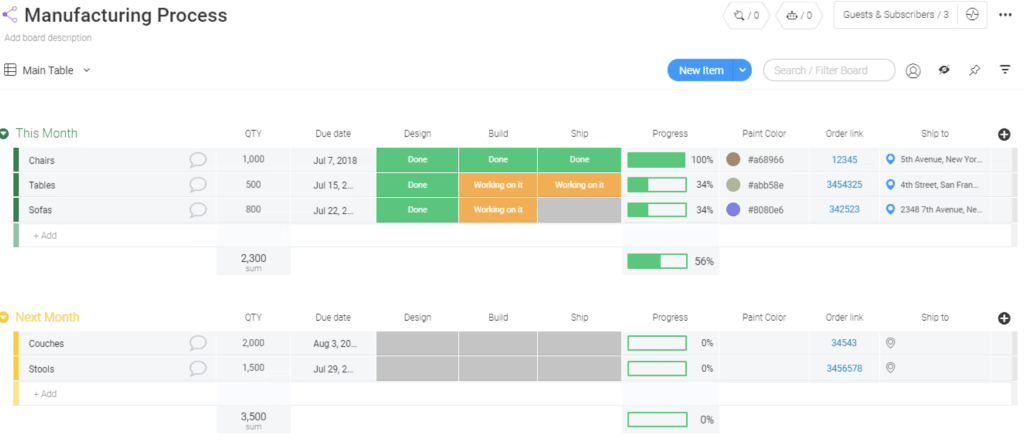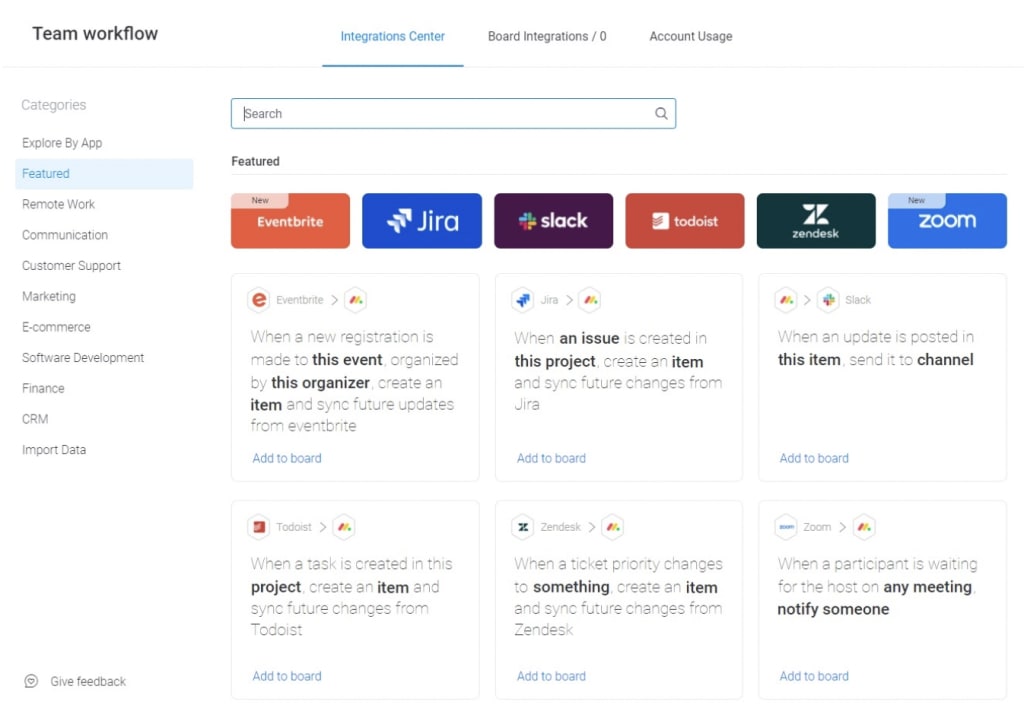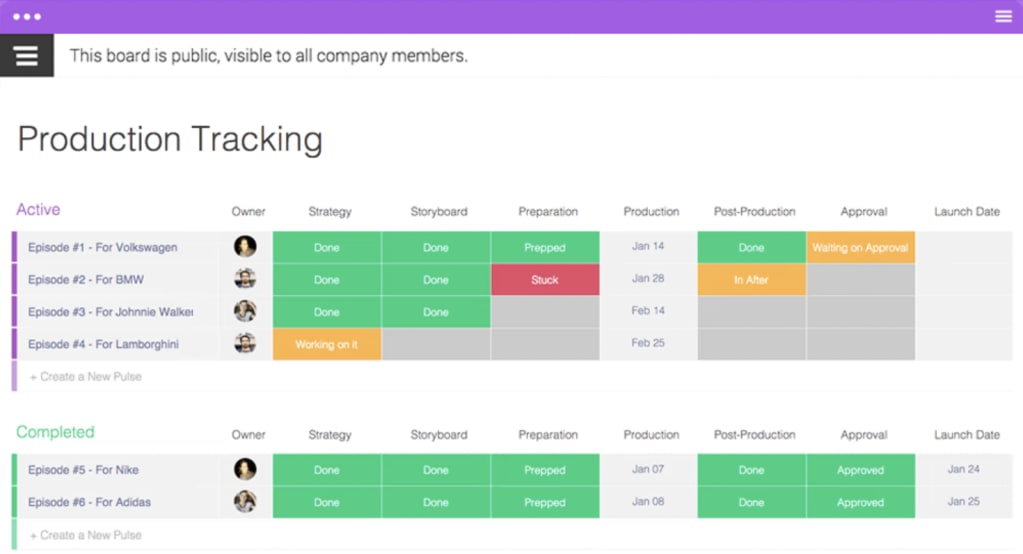There are many moving parts involved in manufacturing. First, the manufacturing process itself is made up of different elements, such as sourcing materials, working with vendors, and optimizing the efficiency of the production line. Then, manufacturers also need to handle inventory, logistics, and distribution.
In order to ensure that manufacturing projects are completed on budget and on time and that no step is missed along the way, it’s important that organizations establish a project management process to help provide structure, organization, and efficiency.
Knowing how involved manufacturing projects are, we’ve broken down the specific benefits of project management for this industry, as well as project management tips specific to manufacturing and how tools like monday.com can help keep everything organized.
What are manufacturing projects?
Manufacturing projects involve the creation of a physical product or component. These projects typically involve many steps, such as planning, design, engineering, production, assembly, testing, and quality assurance.
In addition to products, manufacturing projects are also often related to the development of new processes, technologies, and systems that are meant to improve the production process.
These types of projects can take on many forms, such as designing a new product, developing a production line, optimizing the production process, or even creating a new production facility.
Benefits of project management for manufacturing
Studies show that organizations that use project management practices waste 28 times less money than those that don’t. In the field of manufacturing, where organizations are always trying to cut costs and streamline operations, project management tools and processes can be a huge benefit to projects in any industry and for businesses of any size. The advantages of project management for manufacturing projects include:
Increased visibility and efficiency
Manufacturing projects often involve multiple stakeholders and departments. With project management, manufacturers can have a better understanding of the progress of projects, identify potential bottlenecks, reduce production costs, and improve customer satisfaction.
Reduced error
Project management in manufacturing helps to reduce errors by providing a standardized system for tracking and managing processes and tasks to ensure all steps are completed correctly and on time.
Improved collaboration
Project management enables better collaboration among stakeholders by providing a platform for sharing data and communicating, which in turn smooths the decision-making process.
Cost saving
Companies can reduce waste and increase efficiency with project management, which can improve profitability and ensure that resources are being optimized.
Quality assurance
Project management helps ensure that quality standards are maintained throughout manufacturing, reducing the risk of errors and resulting in improved product quality and customer satisfaction.
5 project management tips for manufacturing projects
Our complete guide to project management can walk you through the specific steps of building your own process, however, there are specific ways to maximize success when it comes to manufacturing projects.
1. Establish your manufacturing project goal
Look at all the different requirements of your project, such as resources, deliverables, budgets, and timelines in order to help set a goal. Establishing a common goal will help you set clear expectations from the beginning so that each team member is aware of milestones, deadlines, and tasks they’re responsible for.
2. Choose the right methodology for your project
After establishing your goals and desired outcomes for your project, it’s time to select the project management methodology that works for you. Popular methodologies include Agile, Waterfall, Scrum, and Kanban. There’s no one-size-fits-all methodology when it comes to manufacturing. Each has its own advantages and disadvantages, so choose the one that makes the most sense for your team and your existing work processes.
3. Utilize project management tools
Technology can be a powerful tool in streamlining the manufacturing process. Project management tools can help automate scheduling, track materials, and analyze data in order to reduce costs, improve accuracy, and increase efficiency. It also allows stakeholders to communicate and stay on top of tasks, so make sure the tool you use supports a high level of collaboration.
4. Have a contingency plan
While you might do everything in your power to ensure the success of your project, unexpected delays and setbacks are often inevitable. Having a risk management plan in place can help prepare your team for potential risks that may arise and keep the project on track.
5. Establish a critical path
A critical path is a sequence of activities that must be completed in the right order and within the right timeframe in order to achieve the project goals. In manufacturing, it’s important to remain proactive in monitoring and managing the critical path. You can do this by ensuring all team members are aware of their role in the critical path and checking with them for potential obstacles that can be worked out before they become bigger problems.
How monday.com can help manufacturing projects succeed
To enhance your next manufacturing project, try using monday.com as your CRM for manufacturing. monday.com provides project managers with an all-in-one software solution that helps smooth along every aspect of a manufacturing project. In addition to being a project management tool, it can be used to manage risk, your supply chain, communicate with stakeholders, and more. Here’s how monday.com can make your next project more successful:
Get started right away with manufacturing templates
monday.com’s customizable manufacturing templates will ensure that you can get quickly adapt the software to your needs. You can import or export Excel sheets in a few clicks, automate calculations, and keep track of progress in one concentrated view.
Take control of supply chain management
With tons of different apps and APIs, monday.com helps you manage your supply chain by integrating your existing work tools, like Slack or Jira. With automation, team members will be notified of updates instantly, helping your supply chain run efficiently.
Track production progress
Set deadlines, assign tasks, build a timeline, and capture order requests on monday.com. As a production management tool, you can replace your spreadsheets and still keep track of the flow of work, vendors, clients, and your production pipeline in one place.
FAQs
What does a manufacturing project manager do?
A manufacturing project manager is responsible for managing and overseeing all aspects of a manufacturing project. They plan and coordinate resources, organize personnel, maintain a budget and schedule, monitor progress, oversee quality control, and ensure that projects are completed on time and that regulatory standards are met.
What are some examples of manufacturing projects?
There are many different types of manufacturing projects, not all of which include developing new products. Some projects may be more focused on optimizing existing practices or creating new ones. This might involve the construction of a new factory, establishing a new assembly line, upgrading technologies, or updating the supply chain management system.
What is project-based manufacturing?
Project-based manufacturing focuses on producing a specific product or service in order to meet a customer’s request, such as manufacturing airplane parts for a specific jet requested by an aerospace company. It involves a more customized approach to production, where the customer is regularly consulted to ensure that their needs and expectations are met.
Reach your goal with the right project management software
Not only will project management software allow you to organize and oversee all elements of your manufacturing projects, but it can also help bring you closer to your overall goal. With tons of different templates to choose from, you won’t lose any time starting from scratch, allowing you to focus on what matters: optimizing production and completing a project on time and on budget.



